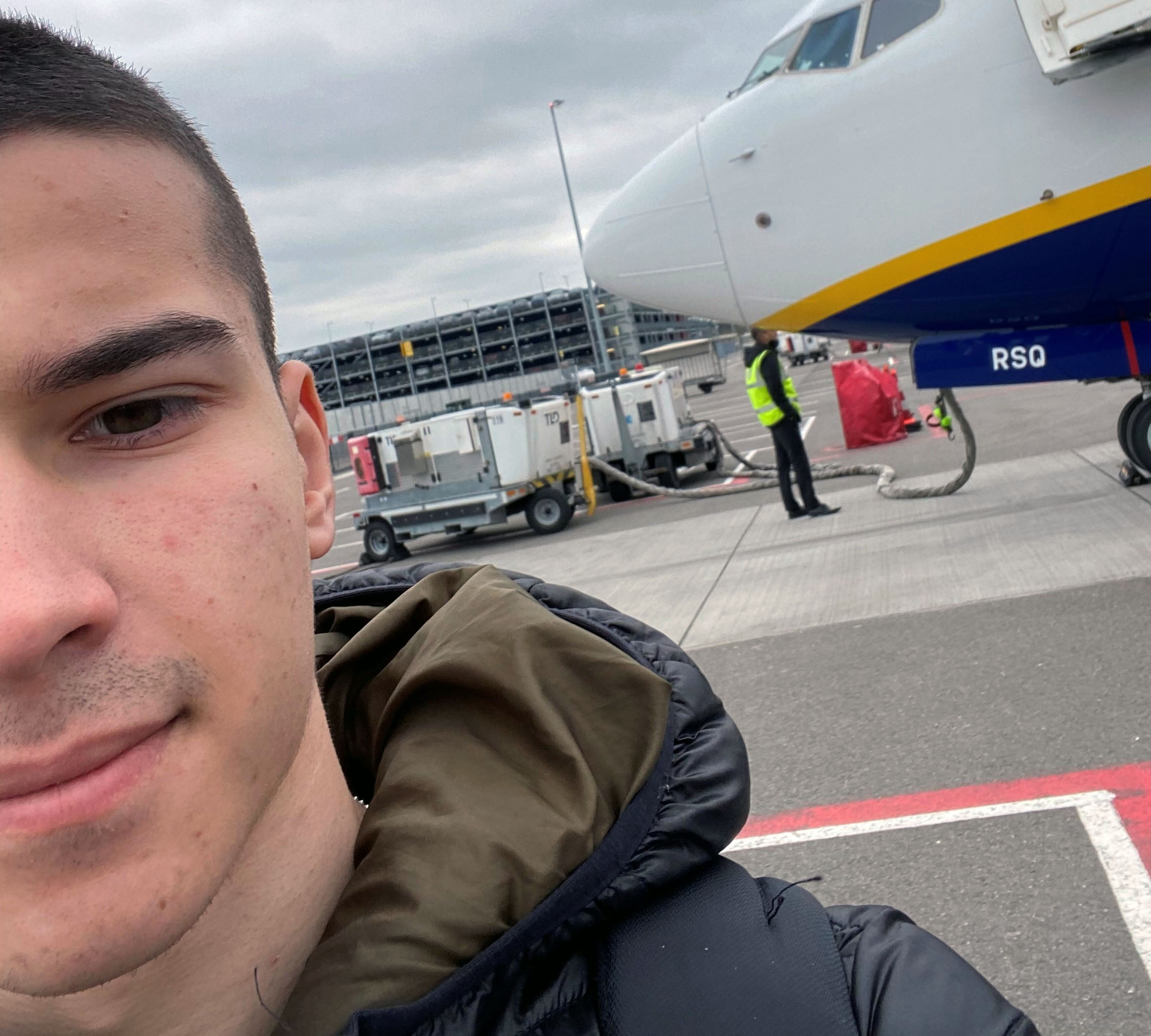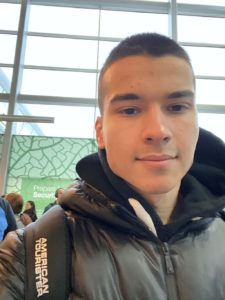Nickolay studies in Tilburg, but lives in Sofia: ‘I take a plane to attend my morning tutorial’
Twice a month, Nickolay (21) gets on a plane from Bulgaria to the Netherlands to come to campus. Not by choice: due to the lack of housing, he could not find a room in Tilburg at the start of his second year. It forced the Business and Entrepreneurship student to return to his parents in Sofia and to follow his studies from there.

“I want to give a big shout out to my mom as she always drops me off very early in the morning at Sofia Airport. From there, I catch my flight to the Netherlands, which usually takes about three hours. After landing in Eindhoven, I take the bus to the city’s central station. Here I get on the train to Tilburg University, where I attend my tutorial at 10:45h.
“Once the tutorial is over, I go study with my friends in CUBE or the library. When we are done, we go to my friends place to play some League of Legends or watch a movie. At night, I sleep on the couch in the living room. The next morning, I get up early and take the same route back to Bulgaria. After my flight has arrived in Sofia, I order a taxi and go straight to work as my night shift is about to start.”
This is what Nickolay’s trip looks like every time he has to come to Tilburg to attend his offline tutorial. Currently, he has one course that has mandatory attendance; if he were to miss two or more classes, he would fail the course. For exams, he usually has to stay for a week or even longer.
Yet it is not only tutorials and exams that make him come to campus. “I would like to be part of the community here and get in touch with new people, which for me is part of studying abroad. I also miss my friends who I met in my first year and who were lucky enough to stay in Tilburg. They are a part of who I am, so I really miss being with them.”
Waiting lists
Before Nickolay had to move back to Sofia, where he now lives with his parents, little brother and sister, he lived with two Bulgarian friends in Talent Square. Every year, Tilburg University reserves a certain amount of rooms in this student complex for international students who can live here for a maximum of one year. Unfortunately for Nickolay and his friends, this was in the midst of the pandemic, so all their classes were online.
When their rental period came to an end, they were left to their own devices in their search for a new place to live. They ended up on huge waiting lists. “For some rooms I signed up over two years ago and right now I am still only on the seventieth spot. It even reminded my grandparents of the waiting lists they had for cars and houses in Bulgaria during the communist regime.”
‘It is a strange feeling to feel discriminated against for the first time in your life’
Originally, they were hoping to find something for the three of them together, but this soon proved to be in vain. Many house lords only rented to families, not to groups of friends. And after doing some research Nickolay also found out that owners are solely allowed to rent a house with multiple rooms if they possess a special permit. “So the housing problem is not only a shortage of buildings, also Dutch regulation is part of it.”
‘International friendly’
On top of all this, Nickolay says he was discriminated during his search. In Facebook groups he encountered the by now notorious phrases ‘Dutch only’ and ‘no internationals’, and during viewings he felt that Dutch people were getting a special treatment. “It is a strange feeling to feel discriminated against for the first time in your life. But it really is the case: Dutch students tend to rent to other Dutch students, which is extra bitter when you realize those student houses are often much cheaper.”
What disappoints him the most is that he was never told about this in advance. Instead, he was made to believe that Dutch people are open and friendly. “It really baffles me that Dutch universities come to Bulgaria to actively recruit us and tell us things that turn out to be lies afterwards. I explicitly remember a student fair in 2019 where a representative of the university was telling me how ‘internationally friendly’ the Netherlands and Tilburg are. Well, I haven’t noticed much of that yet – and I know I’m not the only one.”
“The recruiters never said a word about the poor housing market. As an international, you have no clue how bad it is here until you arrive. And to be fair, if I would have been aware of that beforehand, I would have chosen another place to study business.”
The bright side
After investigating all potential housing options, Nickolay remained without success and made the tough decision to go home. “I literally had nowhere to go. Luckily for my friends, they found something through their connections. I guess I was a little less fortunate.”
Meanwhile, he is able to look at the bright side of his story too. “Living at home is cheaper, no doubt about it. A roundtrip from Sofia to Eindhoven costs me about 150 euros, times two, makes 300 euros. That is definitely less than I would have paid for a room in Tilburg. And because I live with my parents, my daily costs are quite low.”

Nickolay also believes the situation is a valuable lesson that contributes to his personal growth. He is learning, for instance, how to deal with setbacks in life and about his own capacity to adapt. “I think you should have a grand plan for yourself but be flexible to your daily challenges.” Moreover, it is teaching him how to let go of things and to not focus on the things you can’t control. “Stressing out is pointless, it is what it is.”
Offline education
Apart from that one offline tutorial, Nickolay completes his study largely via recorded lectures and online slides, for which he is “very thankful”. But whether this will be possible next year remains to be seen. “From what I know, the university is pushing for more offline education, which is something I don’t support at all. As for tutorials, I get it, but for lectures I don’t. Hardly any interaction takes place between teacher and student in a lecture. It is just a transmission of knowledge.”
“There are more long distance students like me who have not been able to find a room in Tilburg and now live in their home country by necessity. By not offering them an online alternative, you harm their learning process.”
One of the university’s motives for increasing offline education is the risk that students will no longer come to campus if everything is available online. Though Nickolay sympathises with these fears, he feels that the university is not doing what it preaches if it were to impede online classes. “Now that Covid has brought society towards digitalization, I think Tilburg University has no choice but to go along with that movement. Especially when your motto is to understand that society.”






